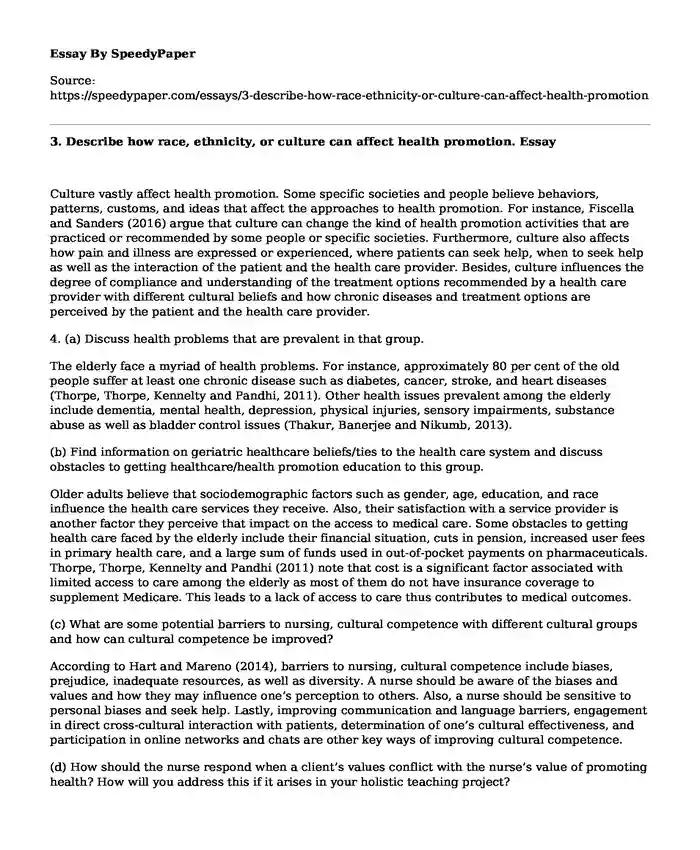
| Type of paper: | Essay |
| Categories: | Health and Social Care Human resources Law Society |
| Pages: | 3 |
| Wordcount: | 637 words |
Culture vastly affect health promotion. Some specific societies and people believe behaviors, patterns, customs, and ideas that affect the approaches to health promotion. For instance, Fiscella and Sanders (2016) argue that culture can change the kind of health promotion activities that are practiced or recommended by some people or specific societies. Furthermore, culture also affects how pain and illness are expressed or experienced, where patients can seek help, when to seek help as well as the interaction of the patient and the health care provider. Besides, culture influences the degree of compliance and understanding of the treatment options recommended by a health care provider with different cultural beliefs and how chronic diseases and treatment options are perceived by the patient and the health care provider.
4. (a) Discuss health problems that are prevalent in that group.
The elderly face a myriad of health problems. For instance, approximately 80 per cent of the old people suffer at least one chronic disease such as diabetes, cancer, stroke, and heart diseases (Thorpe, Thorpe, Kennelty and Pandhi, 2011). Other health issues prevalent among the elderly include dementia, mental health, depression, physical injuries, sensory impairments, substance abuse as well as bladder control issues (Thakur, Banerjee and Nikumb, 2013).
(b) Find information on geriatric healthcare beliefs/ties to the health care system and discuss obstacles to getting healthcare/health promotion education to this group.
Older adults believe that sociodemographic factors such as gender, age, education, and race influence the health care services they receive. Also, their satisfaction with a service provider is another factor they perceive that impact on the access to medical care. Some obstacles to getting health care faced by the elderly include their financial situation, cuts in pension, increased user fees in primary health care, and a large sum of funds used in out-of-pocket payments on pharmaceuticals. Thorpe, Thorpe, Kennelty and Pandhi (2011) note that cost is a significant factor associated with limited access to care among the elderly as most of them do not have insurance coverage to supplement Medicare. This leads to a lack of access to care thus contributes to medical outcomes.
(c) What are some potential barriers to nursing, cultural competence with different cultural groups and how can cultural competence be improved?
According to Hart and Mareno (2014), barriers to nursing, cultural competence include biases, prejudice, inadequate resources, as well as diversity. A nurse should be aware of the biases and values and how they may influence one's perception to others. Also, a nurse should be sensitive to personal biases and seek help. Lastly, improving communication and language barriers, engagement in direct cross-cultural interaction with patients, determination of one's cultural effectiveness, and participation in online networks and chats are other key ways of improving cultural competence.
(d) How should the nurse respond when a client's values conflict with the nurse's value of promoting health? How will you address this if it arises in your holistic teaching project?
A nurse does not accept change passively thus should resolve this conflict with innovation. The nurses should view themselves as having the autonomy to be in control of their practice and creatively work despite the constraints and foster change. I will address this by raising awareness of values and my role in eliciting the nursing practice experience.
References
Fiscella, K., & Sanders, M. R. (2016). Racial and Ethnic Disparities in The Quality of Health Care. Annual Review of Public Health, 37, 375-394.
Hart, P. L., & Mareno, N. (2014). Cultural Challenges and Barriers Through the Voices of Nurses. Journal of Clinical Nursing, 23(15-16), 2223-2233.
Thakur, R. P., Banerjee, A., & Nikumb, V. B. (2013). Health Problems Among the Elderly: A Cross. Sectional Study. Annals Of Medical and Health Sciences Research, 3(1), 19-25.
Thorpe, J. M., Thorpe, C. T., Kennelty, K. A., & Pandhi, N. (2011). Patterns of Perceived Barriers to Medical Care in Older Adults: A Latent Class Analysis. BMC Health Services Research, 11(1), 181.
Cite this page
3. Describe how race, ethnicity, or culture can affect health promotion.. (2022, Sep 06). Retrieved from https://speedypaper.com/essays/3-describe-how-race-ethnicity-or-culture-can-affect-health-promotion
Request Removal
If you are the original author of this essay and no longer wish to have it published on the SpeedyPaper website, please click below to request its removal:
- Latin America
- Free Essay on Native American History in the United States
- Essay Sample on Nursing Practitioners and the Integral Knowledge
- Rudolf Bultmann: On the Problem of Demythologizing, Free Essay
- Biography Essay Example: Frank Aloysius Barrett and John F. Kennedy
- Essay Sample on the Effects of Social Anxiety
- Essay Sample: Understanding Personality Type and Its Relevance to Career Choice
Popular categories




